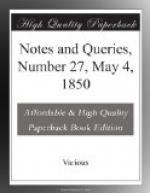E.V.
* * * * *
QUERIES.
THE MAUDELEYNE GRACE.
The rector of Slimbridge, in the diocese of Gloucester, is bound to pay ten pounds a year to Magdalen College, for “choir music on the top of the College tower on May-day.” (See Rudder’s Gloucestershire.) Some years ago a prospectus was issued, announcing as in preparation, “The Maudeleyne Grace, including the Hymnus Eucharisticus, with the music by Dr. Rogers, as sung every year on May Morning, on the Tower of Magdalene College, Oxford, in Latin and English. With an Historical Introduction by William Henry Black.” Can any of your readers inform me whether this interesting work ever made its appearance? I am inclined to think it did not, and have an indistinct recollection that the original MS. of the “Grace” was lost through the carelessness of the lithographer who was entrusted with it for the purpose of making a fac-simile.
Whilst making some researches in the library of Christ Church, Oxford, I accidentally met with what appears to me to be the first draft of the “Grace” in question. It commences “Te Deum Patrem colimus,” and has the following note:—“This Hymn is sung every day in Magdalen College Hall, Oxon, dinner and supper throughout the year for the after grace, by the chaplains, clarkes, and choristers there. Composed by Benjamin Rogers, Doctor of Musique of the University of Oxon, 1685.” It is entered in a folio volume, with this note on the fly-leaf,—“Ben Rogers, his book, Aug. 18. 1673, and presented me by Mr. John Playford, Stationer in the Temple, London.” The Latin Grace, Te Deum Patrem colimus, is popularly supposed to be the Hymnus Eucharisticus written by Dr. Nathaniel Ingelo, and sung at the civic feast at Guildhall on the 5th July, 1660, while the king and the other royal personages were at dinner; but this is a mistake, for the words of Ingelo’s hymn, very different from the Magdalen hymn, still exist, and are to be found in Wood’s collection in the Ashmolean Museum. The music, too, of the Te Deum is in a grand religious style, and not of a festal character.




